#i want galehaut to be there because. it's better that way
Explore tagged Tumblr posts
Text
William Morris' works (3)
We talked about "The Well at the World's End" in the previous post: here I want to talk about the second novel - sorry, romance - of Morris I know about. It is not one of his most famous pieces, but it is a very interesting and fascinating one: The Water of the Wondrous Isles.
It was part of the recent French translations that were published, and as with the last post I will info-mine the préface written for it, this time by William Blanc - and titled "The first feminist Arthurian romance".

Despite the old age of The Water of the Wondrous Isles - first published in 1897 by Kelmscott Press - it manages to be a very modern work, that predicted several evolutions of the fantasy genre nearly a century before they happened. Today it is culturally common to do a "feminine" or "feminist" version of the Arthurian myth (those two are not the same thing), in the wake of Marion Zimmer Bradley's very popular 1982 "The Mists of Avalon" which told the story of Camelot from the point of view of Morgan, reinvented as a great pagan priestess. You also find this with the bow-wielding Guinevere of Fuqua's 2004 "King Arthur" movie. But in a certain way, The Water of the Wondrous Isles did a "feminine Arthuriana" first.
William Morris, like the rest of Victorian society, was fascinated by the legends of the Round Table - he dedicated several of his youth productions to this myth. However unlike Alfred Tennyson, who was a poet adored by the upper-society of England and who liked to depict Camelot in a very misogynistic and conservative way, Morris was basically working for the "counter-culture" by making female characters his protagonists and his heroines. Already in his "Defence of Guinevere" (a verse work published in 1858) he depicted the queen of Camelot put on trial for her adulterous relationship with Lancelot: she offered a speech that turned the accusations on their head, to denounce the sordid institution of arranged marriages. For Morris, it is this tradition which is to be blamed, instead of the legitimate desire of women.
Forty years later, with his "Well at the World's End", Morris offers a variation of the quest for the Holy Grail, where a man and a woman quest as equals. H.G. Wells himself wrote about "The Well", in 1896, praising it for being a version of Malory's works where women are placed on the same rank as men. But what about "The Water of the Wondrous Isles"? A first obvious thing is that one of the main characters is called Arthur, and becomes the lover of the heroine Birdalone. Even better: after many adventures, he has a "madness episode" during which he flees to the depths of the wild forest for several years, almost turning into an animal. This is a common trope of the medieval tales of Camelot: a knight in love loses all reason because of his passion (see Tristan, Lancelot or Galehaut). But Morris, an admirer of the Arthurian myth, turns the tables and changes the tale so that his story corresponds to his political views and so that, more importantly, he can mock the Victorian sanitized versions of the Arthuriana. Here, it is not Lancelot or Tristan who becomes mad, it is rather a character with the name of the king of the Round Table - Morris has his "Arthur" wearing rags, wandering in the wilderness, not as a ruler but as a simple knight in love. So that Arthur takes on the role of the very man who, in the legends, seduced his wife. It is even more striking to notice that, in the medieval texts of the 13th or 15th centuries, once the knight is healed from his madness he returns into the warrior-aristocracy of their society. Within Morris works, such a "return to normal" never happens.

However, it is Morris' handling of female characters which requires a comparison with the Arthurian texts to fully understand his project.
The protagonist, Birdalone, is snatched away from her mother by a witch who turns her into a servant. She escapes by using a magical boat which allows her to cross the lake forming the titular "water of the wondrous isles". Yet, the boat is strange, because to work it requires the blood of its user to be spilled. This dangerous navigation, in which the heroine can lose her life, recalls another famous 19th century figure: the Arthurian poem of "The Lady of Shalott", by Alfred Tennyson (1832). To offer a brief recap, a young woman named Elaine of Astolat lives in a tower where she works on a tapestry. Seeing Lancelot by her window, she falls in love with him, abandons her weaving work, gets out of her tower, takes a boat leading her to Camelot, but dies as a result of her uncontrolable passion devouring her from the inside. Tennyson, with this tale, translates one of the fears of the Victorian patriarchy: to see women escape the domestic space in which they are confined, to see them express freely their desire. The poet warns maidens that such a behavior will lead to a harsh and horrible downfall (see 2000's "Myth and National Identity in Nineteenth Century Britain. The Legend of King Arthur and Robin Hood", Oxford University Press).
Tennyson's poem was fitting perfectly within the British society of the 19th century, and thus was illustrated many times. It was notably loved by the Pre-Raphaelite Confrery, which had many of its member later becoming friends of Morris: Elizabeth Siddal, in 1853, or Dante Gabriel Rossetti in 1857 both illustrated the poem. William Holman Hunt also made a drawing of Elaine in 1857, depicting her engulfed in her madness (symbolized by her disheveled hair, with the weaving of her tapestry mimicking a spider web). The colorized version of this drawing (1888-1905) is even more explicit: the young woman turns her back on a depiction of the Virgin Mary (see Jeffers Thomas' "Tennyson's Lady of Shalott and Pre-Raphaelites renderings: statement and counterstatements"). And of course, John William Waterhouse offered two different paintings of the tragic fate of Elaine, one in 1888 and one in 1894.

William Morris has this entire set of imagery in his head when he write "The Wondrous Isles", but he inverts it: the boat of Birdalone does not take her to her doom, but rather helps her escape imprisonment - she flees the domestic slavery in which the witch maintained her and lives various adventures. [In the text, Morris has the witch call Birdalone her "thrall", a term from the Old Norse society to designate a slave - the use of such an archaism is a manifestation of Morris' fascination for Old Norse texts]. To get out of the house is to encounter life, not death. In fact, we see here Morris criticizing the harsh conditions house-workers lived in as they toiled in the homes of upper-class Victorian families. When "The Water" was written, a third of the employed women were house-workers, and they were roughly in their twenties, just like Birdalone (see Davidoff Leonor's "Mastered for Life: Servant and Wife in Victorian and Edwardian England", and Theresa M.'s "The Domestic Revolution: The Modernization of Household Services in England and France 1820-1920").
Birdalone escaping through the boat is Morris' way to represent a woman free of the weight of the conservative Victorian society: she is free to go wherever she want, and to love whoever she wants. But these adventures have their dangers: throughout her journey she meets brutal men who, to possess her, threaten her and wound her - some even openly claiming they will rape her, such as the Red Knight. We find here a recurring theme in Morris' Arthurian texts, who is likely inspired by the murder of Morgause at the hands of her own son (who accuses her of adultery) in the medieval "Morte d'Arthur" ; he might also be influenced by the fate of Guinevere. Morris often depicts a masculine and patriarchal violence against women, but only to denounce them, such as through the trial of the queen of Camelot in "The Defence of Guinevere" ; or with the murder of the Sun Knight's wife in "The Well at the World's End" (the Sun Knight himself being a clear reference to Gawain).
But Morris doesn't depict the tragic condition of women as a fatality: on the contrary, his heroines fight back against the masculine aggression. Guinevere has her long defence-speech to denounce all those that condemn her relationship with Lancelot, Birdalone fights at first with a bow (a weapon commonly associated with women in Victorian England, as they practiced archery for sport), then wears an armor and uses a sword to attack and defend herself or her kin. Of course, Morris is still a man of his time, and so he depicts Birdalone easily outmatched every time she fights a man... But in this end of the 19th century, to have a woman fighting is a shocking thing. In the USA, one would have to wait forty more years before the fantasy pulps starting putting as main characters female warriors - such as C.L. Moore's Jirel of Joiry or Robert E. Howard's Dark Agnes.

Birdalone does not just go through her trials by fighting. As Florence Boos noted, the heroine of "The Water" uses the help and assistance of other women (Boss Florence, "The Socialist New Woman in William Morris' The Water of the Wondrous Isles): the three maidens, Aurea, Atra and Viridis, but first and foremost Habundia, the "Lady of the Wood" who helps Birdalone flee the house of the witch.
Habundia has a unique place within the text: associated with magic and the forest while clearly not being part of the human species, she reminds of another famous Arthurian woman at the time: Viviane. Just like with the Lady of Shalott, Tennyson gave Viviane a bad name in his poems. In his "Idylls of the King" (1859), he depicts Vivien as the one who trapped Merlin with her spells, in the heart of the forest, to steal his powers before locking him inside an oak-tree. We find back this fear of the Victorian patriarchy that is the "fallen woman", the "prostitute, the temptress, the archetype of the woman who, just likes Eve, drags men to their downfall (see Auerbach Nina's "Woman and the Demon: The Life of a Victorian Myth"). Like in medieval literature, the male doom is tied to the forest, perceived as a wild and dangerous space. In Gustave Doré's engravings for Tennyson's Vivien, we see Merlin as a very old man trapped between the young seductress and a tree whose roots wrap themselves around the couple.
Morris rejects this imagery: just like with Elaine or Guinevere, he inverts the tradition. Habundia offers a positive Vivien: with her, the forest and magic are not perdition, but salvation. Inverting Tennyson's discourse is not just a way for Morris to oppose himself to the famous conservative poet ; it rather takes place in a larger political context. Ever since hs youth, Morris has been influenced by the progressist Romantics. In the early 1880s, he engaged himslf in socialist revolutionnary movements: in 1883 he joined the Democratic Federation of Henry Hyndman, before co-founding at the end of 1884 the Socialist League and becoming the chief redactor of its newspaper, "Commonweal", to which participated Paul Aveline and Eleanor Marx (daughter of Karl Marx). While they mostly focused on questions of "classes", they still formed a thought about the life conditions of women, and denounced the bourgeois patriarchy. In 1885, they published the English translation of August Bebel's 1879 Woman and Socialism (Bebel was one of the leading figures of the German socialist movement). Simultaneously, a scandal erupted when William Thomas Stead published an investigation about child prostitution. All of this pushed Eleanor Marx to write with Paul Aveline, in 1887 "The Woman Question" (see Kapp Yvonne's "Eleanor Marx, a biography"). One year later, Morris and other members of the Socialist League supported the strike of female workers in the match-making factories of London (see Taylor Rosemary's "The city of dreadful delight: William Morris in the East End of London").
The institution of marriage is the focus of the socialist critique against women's life-conditions in Victorian society. The manifesto of the Socialist League, published in the first issue of "Commonweal" and cosigned by Morris and Eleanor Marx, compares marriage to prostitution. Eleanor Marx goes further in september 1885 by claiming that the sexual exploitation of women is the same as the salarial exploitation of capitalism. All of this transpires in the fate that the witch prepares for Birdalone: she is born from a poor family, her body is entirely offered to her new "mistress", and said mistress not only uses the girl for manual work, but also plans during her teenagehood to prostitute her. A passage of "The Water" seems to take back the same comparison Eleanor Marx makes between domestic work and prostitution.
In front of all this, Birdalone does not find a solution in the protection of a male figure: rather, she emancipates herself through her own work, notably her mastery of embroidery. The witch wants her to use this art to better seduce men, but Birdalone transforms it into a tool to gain her freedom.

"The Water of the Wondrous Isles" prefigures several motifs that shall become central in 20th and 21st century fantasy, but it also depicts something original for fantasy: a fantasy world where a lot of focus is given to crafts and the artisanal world ; something quite unusual in an epic genre that often ignores handwork.
Morris is a socialist, but also a heir of John Ruskin, who opposed the alienation of the 19th century factory-worker, used in a chain-work to reproduce endlessly the same calibrated ugly objects, to the (very idealized) freedom of the medieval craftsman, able to be autonomous in his work and to create unique (and thus beautiful) items. Morris put this thought in practice: all throughout his life, he interested himself in the "decorative arts", creating furnitures, wallpapers, staine glass and tapestries. He founded his very own society, Morris and co., in 1861, and thirty years later he opened his own publishing house, Kelmscott Press, in which he tried to create books imitating medieval manuscripts. Morris does not separate craftsmanship from his literary productions, the two are linked: the beautiful book is a box containing the beautiful text, and together they form a prolongation of his political engagement, an answer to the ugliness produced by the industrial capitalism.
In "The Water of the Wondrous Isles" Birdalone embodies this political valorization of labor. Her goal in life is not to marry a beautiful prince or to have children, but to become autonomous through her work. An entire part of the book depicts her leaving her friends to work with her own hands in the City of the Five Crafts. This industrious community evokes the descriptions Tolkien would write sixty years later of the Shire, in The Lord of the Rings (Tolkien was five when "The Water of the Wondrous Isles" was published) ; but whereas Tolkien's creation is a small countryside society, Morris presents an entire city where the handwork is not decorum but rather the heart of the action: when she arrives, Birdalone proves her talent and is quickly accepted by a local guild. She later creates her own workshop, and for five years she wlecomes numerous women in it, before leaving and offering her business to her coworkers. This reminds us of the activities of Morris, with his "Morris and co." and "Kelmscott Press" ; it also reminds us of the "socialist future" imagined by Morris, a future in which the guild system of the Middle-Ages returned, to oppose the capitalist exploitation (this idea of the future is what later gave birth in the British Left to the "Guild Socialism").
The sejourn of Birdalone in the City of the Five Crafts, which forms the introduction of the sixth part of "The Water", is not just an aside: it is a central element, because Morris shifts again a traditional motif. The one of Cinderella: in the version that the brothers Grimm popularized and that Morris is aware of (he asked Edward Burne-Jones in 1864 to make ceramic ornaments depicting the Grimm's Sleeping Beauty and Cinderella), Cinderella, a girl from a modest background, marries a prince. Morris' similarly humble heroine meets the beautiful knight Arthur, but their relationship does not elevate Birdalone in society. On the contrary, Arthur and her leave the castle and settle themselves in the birth-town of the young woman, governed by a council. Here, Arthur becomes part of this tiny republic, earning a role that Morris explicitely compares to a Roman consul. Meanwhile Robert, a former employee of Birdalone who worked with her at the City of Five Crafts, marries Aurea, a noble friend of Arthur. The tale ends in a hamlet of craftsworkers where the frontiers between the classes are broken: only remains a community of free workers, the medieval town becoming an allegory of the future socialism.

The political fight of Morris is mixed with a fascination for, and an idealization of, the Middle-Ages. His vision mixes progressist hope and a nostalgia for a lost era. He explored it in his 1890's utopia, "News from Nowhere", and we find it here through the character of Habundia. Unlike the other companions of Birdalone, at the end of the story she does not live within the city, but in the nearby forest. She does not embody Middle-Ages of guilds, but rather the Middle-Ages which are (ever since the 18th century) associated with an idealized nature, the druids, the fairies and the elves. The Lady of the Wood is "not from the race of Adam", she is not a human being, but she is far wiser than humans and owns an ancient knowledge that she describes as a "great book of nature", a knowledge that she transmits to Birdalone.
We find here a typical motif of fantasy: the "wise one" from a non-human race who lives in an ancient forest. It is Galadriel, from The Lord of the Rings, it is Yoda from The Empire Strikes Back. Morris doesn't invent this motif: it already existed at the end of the 14th century, in Chaucer's "Tales of Canterbury", within the story of The Wife of Bath. Taking place in Arthurian times, the texts opens with a description of the Queen of the Elves dancing merrily with her subject, before holy Churchmen banish them away. Morris knows this text, and Kelmscott Press published in 1896 a beautiful edition of the Tales of Canterbury, illustrated by Edward Burne Jones (in general, many echoes of The Wife of Bath's Tale can be found within The Water of the Wondrous Isles). But whereas Chaucer rejoices in the disappearance of the elves, Morris regrets them. This nostalgia, which will be found again in Tolkien's works, is a new thing for the Victorian era, and it translates a new fear: the one of seeing nature disappear because of industrialization. Morris interwoves this with a political thought: at the end of the 19th century it was a common thing to believe, in socialist circles, that many pre-industrial ancient societies were organized in a communist way. This "proto-communism" was explained by the fact these ancient societies were supposedly dominated by women, a trait thought to have survived in the Norse and Germanic societies of early Middle-Ages but that disappeared with the apparition of "private property", which imposed a patriarchal power.
This idea, originally created by Friedrich Engels in his 1884's The Origin of the Family, Private Property and the State, heavily influenced Morris. (See Boos Florence's "Gender-Division and Political Allegory in the Last Romances of William Morris", and Eller Cynthia's "Gentlemen and the Amazons: The Myth of Matriarchal Prehistory") This imagery, which was a very idealized version of the past, fully played in the creation of Habundia. She embodies the perfect "original past", a past without economical property, without social property, without sexual property. If we admit that the city where the adventures end symbolizes an utopia, a prefiguration of socialism, the last pages of "The Water" allow an idealized past to neighbor a desired future: the primitive-communism of Habundia and the democratic city of the free craftsmen. Between the two is a nightmarish aside, the one of the industrial and patriarchal capitalism, in which the reader lives, and expressed through the character of the witch, who took Birdalone from her mother, abused her, and is never forgotten.

#the water of the wondrous isles#william morris#fantasy literature#pre-tolkien fantasy#fantasy book#fantasy archetype#political fantasy
21 notes
·
View notes
Note
For the ask game: Galehaut! A few (too many) quotes (I couldn't choose!): 1. "He had put into his love for Lancelot everything a man could put: heart and body and, most precious of all, his honor. He had so given up his body to him that he would rather have seen himself die than Lancelot; he had so given him his heart that he could have no joy without him. And out of his great love for him he had cried mercy to King Arthur even though he had overcome the king and almost dispossessed him."
2. "I have framed my love in such a way that if you died I would pray God to let me not live another day. I am very much afraid I will lose you soon, afraid we'll be parted by death or some other separation. I'll tell you, too, that if the queen were as kindhearted toward me as I have been toward her, she wouldn't strip me of your companionship and offer it to someone else, even if I had done no more than fulfill her great desire and bring you your great joy. Still, I mustn't blame her if she wants to please her own heart more than another's; she even told me once that you can't be generous with something that you can't give up. And I have realized as much. So I want you to know that when I lose you, the world will lose me." 3. "I will give you half the lordship over all the land that I hold and have you acknowledged by all my barons. You will receive their oaths of fealty and their promise to help you guard against anyone wishing to harm you; and they will do homage to you as to me. We will be crowned together this Christmas when my lord King Arthur holds his court, and the day after our crowning we can leave with all our troops to take back your lost kingdom. . . You will have my land, with all of its riches and beauty, and lordship over twenty-nine kingdoms. And out of love for you I will win back your inheritance, and I will love it better than my own and all the land of King Arthur." 4. Sir Gawain said to the king, "My lord, you will lose Lancelot, if you don't take care, for Galehaut will take him away as soon as he can; he is more jealous of him than any knight is of a young lady." 5. HERE LIES GALEHAUT, THE SON OF THE GIANTESS, LORD OF THE DISTANT ISLES, WHO DIED FOR THE LOVE OF LANCELOT
Hi Lim!!!!! Omgggg, Galehaut, my buddy Galehaut!!!! (Also, BEAUTIFUL QUOTES WILL ROTATE THESE FOREVER!!!!)
Sunlight by Hozier
You're probs thinking 'Satah, this is a Gawain-coded song' WRONG. This is giving me emotional damage because I genuinely do believe Galehaut does love Lance with his whole fucking heart and he thinks of him as being like the sun. 'Love and it's decisive pain?' Fuck OFF, ANDREW BYRNE. SICK BASTARD. SICK. THEY LOVE EACH OTHER SM AND SHSJSJSSJSJSJS
ALSO,
In Love by H. Hawkline
Self-explanatory. Plus I just think it describes his malaise/longing for Lance.
8 notes
·
View notes
Text
Okay last collection of thoughts before I verify some legal stuff for work.
My brain naturally wants to pick an FPS since that's what I'm more familiar with. Lancelot is top frag. Too cliche to have the gril as the manager so Gwen as the coach and Arthur as the manager/team owner? His dream was a non-toxic esports culture so he made a team with those ideals in mind. Excalibur is him being worthy of the fuckton of money it takes to run a team lmao.
Lancelot's initial misogyny can be him not immediately realizing Gwen is the coach. He also sometimes doesn't listen to coaching stuff and its hard to tell whats misogyny (its probably not) and whats overconfidence and running into enemy backlines/ego peeking. The rest of his off-putting behavior is him being way too serious when it comes to fun team get to know the team social media events. Also he doesn't go out for KBBQ with everyone so he can stay at home and aimlabs/OSU it up (the korean bit can be leaned into that its totes better in korea).
I'd probably include more of the other knights. Galehaut is a recruiter for a different org. It doesn't go into match fixing but like, Lancelot goes out to a sponsor thing with them because they seem nice and they help them get a sponsor for a new facility or something. Gawain is the only person Lance will duo with on-stream (note to look up more of the charismatic Gawain characterization)
Because this is my story I can do what I want, the downfall of Camelot (the team) is that they're poly but some of the teammates/sponsors are not cool about that arrangement slash being repped by a "cuck", consensual parties be damned. Plus the overarching conflicts of interest I guess. The end is that they still set a precedent in esports for like, not being toxic or whatever but also they all retire and do something else.
all of this is moot because the entire league falls apart at the hands of bad game corporate management
The biggest thing to contend with is that, generally, esports players tend much younger so kids are out of the question.
Camelot esports AU
4 notes
·
View notes
Text
That ominous child
Since everyone seems to argue and hypothesize about the identity of King’s and Diane’s child, and Nakaba can’t be bothered to offer answers, I decided to throw my own hat into the ring. Using The Encyclopedia of Arthurian Legends - the best book EVER - I have devised a list of the ten most interesting and most likely candidates from a variety of Arthurian stories. Most of these have been named by others before, but I’ve come across a few obscure characters that might be worth considering. Five guys, five girls, here we go:
#1 Gawain
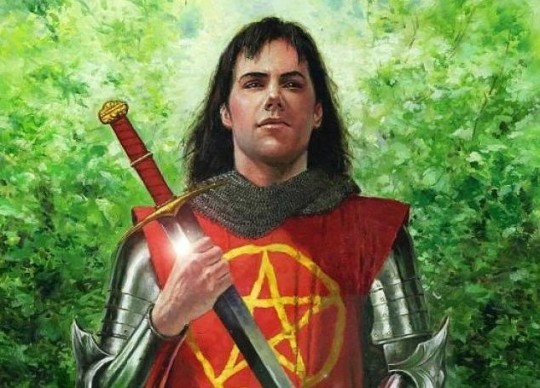
I’ve read this take a few times, but honestly, I find him to be an unlikely candidate. As Arthur’s nephew, Gawain has next to no ties to the Fairy Clan (or Faerie if you prefer the old spelling). Gawain also has a track record of becoming an antagonist to Lancelot, including his role in Le morte d’Arthur (Thomas Malory). Could a rivalry between Lancelot and his cousin work in nnt canon? Certainly, but I find it unlikely. I like Sir Gawain and the Green Knight (unknown) as much as the next guy, but I have a hard time connecting his personality with either King or Diane. There’s also Gawain’s ability that increases his strength by noon, which is the same as Escanor’s Sunshine. In short, I wouldn’t be surprised to see Gawain make an appearance in The Four Knights of the Apocalypse, but not as King’s and Diane’s child.
#2 Perceval (or Percival)
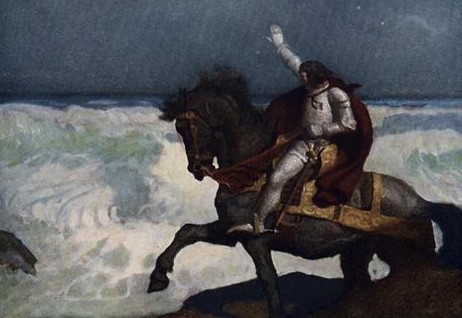
Now, this one’s interesting for two reasons: his ties to the Holy Grail and his origin. In The Story of the Grail (Chrétien de Troyes), Perceval is said to be raised in a forest by his mother, who doesn’t want him to become a knight. With Diane’s natural resentment to fighting for the sake of fighting and after what happened to Lancelot, I could see King and Diane wanting to avoid their child to follow in their footsteps and become a knight. As for the Holy Grail, which shares resemblance to the Fountain of Youth in nnt, Perceval was one of several knights who found the grail. The list includes Gawain, Bors, and Galahad, Lancelot’s son. What makes Perceval stand out among these, however, is that in a continuation of The Story of the Grail (Manessier), he is revealed to be the nephew of the Grail King and he inherits his kingdom after his death. If we consider Ban the Grail King due to his relation to the Fountain of Youth, Perceval might just be the name of his so far unidentified nephew.
#3 Bors
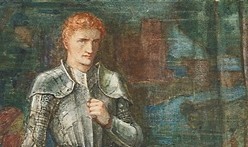
I heard his name being tossed around in conversation a handful of times, mostly because Bors the Younger is Lancelot’s cousin according to Malory. And while Nakaba seems to take a lot of inspiration from Malory when it comes to family relations (look no further than Tristan’s and Lancelot’s parents), in Arthurian Legends, everyone is related to everyone. In the Historia Regum Brittaniae (Geoffrey of Monmouth), Ban’s sister Ivoire is the mother of Uther Pendragon, which makes Lancelot Arthur’s uncle once removed. What I’m trying to say is, Bors is not the only one related to Lancelot. But to be fair, Bors is a Knight of the Round Table, and therefore a companion to Lancelot and Tristan. So, if King’s and Diane’s child is named Bors, it won’t be entirely out of left field.
#4 Oberon
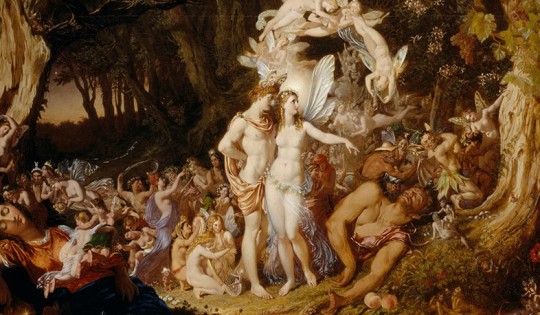
A popular choice for a reason. Oberon is featured in a handful of Arthurian poems as king of the fairies, so he certainly has a connection to King and the Fairy Clan. The only problem I see is that Kings child, no matter who they are, would likely not succeed him as Fairy King. The Sacred Tree makes that choice. Regardless, while Oberon might never be the Fourth Fairy King, he could feature as first prince of the Fairy Clan.
#5 Galehaut
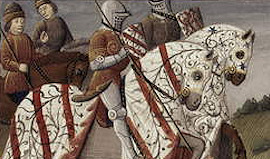
An interesting side character of Le morte d’Arthur (Malory). Why? Because his mother was the giantess Bagota, which makes him a canonical hybrid. His title as ‘the high prince’ would also fit his identity as King’s and Diane’s child. And as a final bonus, Galehaut is a firm friend of Lancelot and through him became a Knight of the Round Table.
#6 Morgan Le Fay
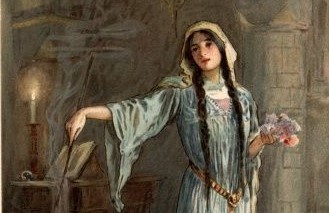
My personal favorite. While she is Arthur’s half-sister in most stories, when she appeared in Vita Merlini (Geoffrey), there is no mention of her blood relation to Arthur. Instead she is said to fly with wings and be able to change her form. Sounds like another Fairy we know, doesn’t it? Morgan learned magic from Merlin, and since the nnt versions of Lancelot and Tristan seem to focus more on physical rather than magical combat, I think it would be nice if King’s and Diane’s child filled that gap. What’s also worth noting about Morgan is her connection to the Fairy King Hellekin, who in Italian romances became better known as Harlequin. In Li Jus Adan (Adam de la Halle), Hellekin is the lover of Morgan Le Fay, and while that sounds weird as an argument in favor of her being King’s daughter in nnt, Nakaba could always ignore this detail. Or Morgan will be the real name of the Lady of the Lake, who knows at this point.
#7 Nimue
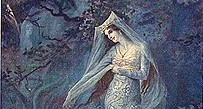
Some sources such as Myths of Britain (M. Senior) argue that Nimue is a variant of Vivian, and that they are the same character. Both are typically identified as a Lady of the Lake. Nnt already has a Vivian, and the way she kidnaps Gil and obsesses over him bears resemblance to what Nimue does to Merlin in Le morte d’Arthur (Malory). Then why did I include Nimue? Because Nimue/Vivian is the the granddaughter of the goddess of the wood, who, in the prose of Vulgate Version (unknown), is named Diane.
#8 Iseult (or Isolde)
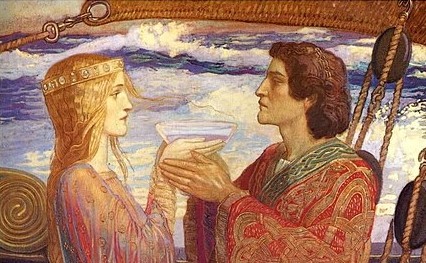
This one only works if Kiane’s daughter will have a romance with Tristan. I’m not saying that is impossible, but how often does it happen that the the children of friends fall in love? It’s a nice trope, but if King’s and Diane’s daughter were named Iseult, her fate would be a little too predictable. And I guess this would also mean that the Fairy Realm is the equivalent of Ireland... so it works perfectly!
#9 Caelia
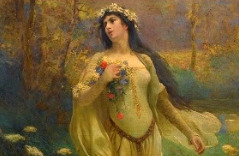
My wild card. She is only featured in one work, as far as I know, A Collection of Early English Prose Poems (edit. W.J. Thomas). Caelia is here the Fairy Queen and the lover of Arthur’s illegitimate son, Tom a’Lincoln. So, if Arthur already has a child at the beginning of the sequel, and if said child is in need of a love interest, King’s and Diane’s daughter might just fit the bill. Let’s just hope that nnt Caelia won’t drown herself.
#10 Laudine
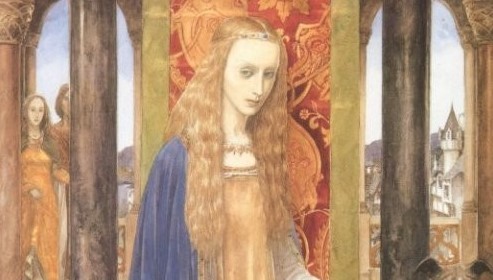
Last one, this post is already longer than it has any right to be. In The Knight with the Lion (Chrétien), Laudine is the lady of a magical fountain in the forest of Broceliande. This creates a nice connection to Elaine, doesn’t it? And if the Fairy King’s Forest will somehow find a new Fountain of Youth, perhaps King’s and Diane’s daughter will guard this new fountain, just like Lancelot guarded Benwick in his father’s place. Laudine later became the wife of Owain (or Ywain), another Knight of the Round Table and Arthur’s nephew.
...
Or Nakaba messes with us and picks a random name out of a hat to assign to King’s and Diane’s ominous child.
#nnt#nanatsu no taizai#seven deadly sins#arthurian legend#kiane#kiane child#four knights of the apocalypse#this took way too long to write#long post#happy hypothesizing#arthurian legends are confusing#especially when they contradict each other#consider this my thesis#gawain#perceval#bors#iseult#morgan le fay
73 notes
·
View notes
Text
Hi, it's Valentine, back with another essay on Lancelot again. I’m deranged and you all have to accept this. Anyways this ones been a long time coming mostly because i'm lazy and only now had some free time to sit down and delve into so many sources to find quotes and proof for the main claim of this post: Mr Lancelot du Lac is an autistic man. Hes also trans and gay and i have proof for both of those (one is literally not even subtext) but those are for different essays.
Anyways to start off with some smaller bits I wanna at least mention the history connecting autistic people with changelings or fae. The idea of a normal seeming child being “replaced” by something not entirely human to explain neurological differences has been around for a while and can tie in with a lot of autistic people's feelings of being different or completely disconnected from those around them. Thematically all of this ties in with Lancelot’s narrative of being “stolen away” by a fae as a child and coming back different. He grew up in a realm of fairies, and Chrétien de Troyes in Knight of the Cart, which may be the first story about Lancelot, simply calls his mother who in later texts grows to be the Lady of the Lake, “a fairy.” Another smaller point is Lancelot tends to go nonverbal when he gets extremely upset which is neat! One bit i can’t get a quote for (vulgate pdf when) is after Galehaut’s death, he locks up completely and his mother, the Lady, who is wonderful and perfect, explains the situation for him. You could also look at all the times Lancelot runs off into the woods and refuses to speak for a while for more proof of that. He does this a lot. It's just a thing people expect from him.
Anyways, I wanna talk about Lancelot’s inability to comprehend emotions or communication in general. Please, I've been dying to talk about Lancelot’s issues with communication for days. God he has them and I can relate so hard. Covering the dutch prose first just look at the story of the hart with the white foot. A lady comes to court talking about how whatever knight will get the foot of his hart will get her hand in marriage. Lancelot actually ends up missing the lady speak about what will happen, and after hearing Kay fail to do it, declares hell go after this hart instead. "When he heard this account / he spoke impetuously: / "By my faith, I fully intend / to follow this little dog.” He doesn’t think it though, he doesn't really know what he's getting into, Lancelot is just a yes man who likes doing knightly deeds. He has to in the end be rescued twice by Gawain, one from his fucking up while hunting the hart, and the other by accidently leading a lady on thinking that he’ll marry her, something Gawain negotiates Lancelot out of. Moving onto not the dutch prose since i just spent 3 hours reading up on it, let's move onto le morte.
Malory pulls a lot from the french sources, and i'll talk about what he left out in a sec cus . god. But I mostly want to touch on his relationship with two of the people he’s closest to, those being Guenevere and Gawain. Guenevere is a very weird case considering her literal emotional manipulation of him in moments he is very vulnerable and just how not great she is to him in general but his take on their relationship is honestly pretty easy to pin down. Lancelot honestly idolizes Guenevere, as his queen, as his lady, as a person who showed him basic respect when he first came to court. He has the mindset that a knight should love and do anything for his lady, and after Guenevere knights him really without any thought to what she was doing, he decided he would do anything for her. The vulgate does a better job dealing with their relationship through the mediator figure of Galehaut who is a whole other bag of worms, but Guenevere mostly indulges him for the fun of it. She sees that he’s a young knight who’s willing to die for her and uses this to her advantage politically and for other reasons. This constantly goes over Lancelot's head, until towards the end of le morte where he finally realizes how much he suffers for this relationship while she doesn't even care, “This is not the first time, said Sir Launcelot, that ye had been displeased with me causeless, but, madam, ever I must suffer you, but what sorrow I endure I take no force.” He resigns himself to put up with a relationship he admits is actively hurting him because he believes it’s love, and as a good knight, he should love his lady. His relationship with Gawain is less dicey, and more him constantly not getting Gawain’s implications. He admits to his love of Gawain only during their war saying in the vulgate, “But he will never be able to hate me so much that I stop loving him." Like. bold of him to just ignore all of Gawains previous advances until theyre in a life or death war. Bro accept your homoerotic rivals and move on already.
Another casualty from Lancelot not realizing emotional connotations until too late is Galehaut, who literally dies of longing over the knight. Like Elaine of Astolat but worse because Galehauts just genuinely one of the best people in Arthurian literature. He doesn’t realize until too late that the person who actually loves him is the one willing to do anything for him, and ends up almost killing himself over Galehauts death. I have too much to say on that and it's not relevant to anything in this essay but god know i yearn over them all the time.
Other thing is Lancelot has a lot of struggle with mental health anyways, he really just truly is traumatized and that’s kinda fucked. He has a lot of problems with depression and poor coping mechanisms. I mean his main coping mechanism is falling asleep instead of dealing with the issues. That's not completely on topic but it's a big mood and ties in vaguely and also i don't have any other way to end this. There are way more bits to add but i am falling asleep at my desk and need to get lunch before it gets too late. Anyways this is probably not great i wrote this in 4 hours directly after waking up at 12 and spent 2 of those hours reading literary essays on the dutch romances. GOOD NIGHT .
#this got out of hand quickly because of how tired i am and i DO NOT CARE.#is this good? no. absolutely not . my eyes are burning and i need food. but OH WELL#txt
49 notes
·
View notes
Note
Galehaut calls Elaine and Guinevere, mainly Elaine, out on their treatment of Lancelot
Galehaut shuts the door, gently, rage making him tremble but still under control. He knows he has to be careful, his loyalty is begrudgingly owned by Arthur so he will do all he can to protect his kingdom. It is what Lancelot wants from him.
Guinevere and Elaine are yelling at each others, accusations flying, careless of the door that has been open till a moment before. They are not thinking of people who might hear them, and Galehaut feels even angrier.
“You should be more careful,” he tries, because the last thing he wants or need is for gossip about Lancelot and the queen to start again.
“You are taking the side of this woman?” Guinevere demands, standing tall and proud, pointing at the lady from Corbenic with fury. “This woman who comes here with her child, perfectly knowing Lancelot desires nothing from her.”
“And you?” Elaine shouts. She is small, smaller than Guinevere, only standing up to her shoulder, but she looks as angry as the queen. “You keep him trapped with your love, instead of letting him have a life and a wife.”
“And you would be the wife? Don’t make me laugh,” Guinevere snarks.
“Enough!” Galahad exclaims, rising his voice for the first time.
The two women turn to look at him, both surprised. People say he is the son of giants, and here he stands taller than these two ladies.
“I want you to stop. Queen Guinevere,” he starts, and he is surprised to see that she is waiting for him to continue. “You have toyed with Lancelot and accused him of being disloyal, when you perfectly know he would die for you. You want to see him promising you over and over again that he loves you. That is just cruel, and not befitting of a queen.”
Elaine’s thin lips turn into a smirk, so Galehaut is quick to turn to her as well. “And you. You have hurt Lancelot more than anyone. You have taken something from him-” he stops, Elaine is shaking now, probably in anger. “Leave now, I do not want to see you here, ever again. And you should better remember, for the sake of both your countries and kingdoms, that my loyalty does not reside in Arthur. Lancelot is why I am here, so be careful of the way you care for him.”
8 notes
·
View notes
Text
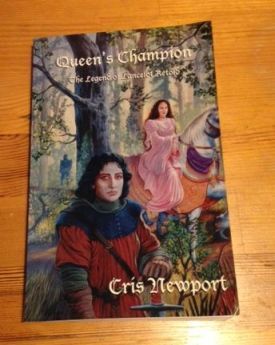
Read this lesbian retelling of romance between Guinevere and Lancelot. It’s ok. Wish I could have liked it more, but due to some personal preferences I found it a bit underwhelming.
I like Arthurian legends and chivalric romances, and I like the story of Guinevere and Lancelot. Yes, I’m very much aware most people think it’s a story done to death and Lancelot is considered a boring Mary Sue. I make no attempt to hide the fact that the 2011 Takarazuka musical about the subject is like 98% of the reason I like the story.
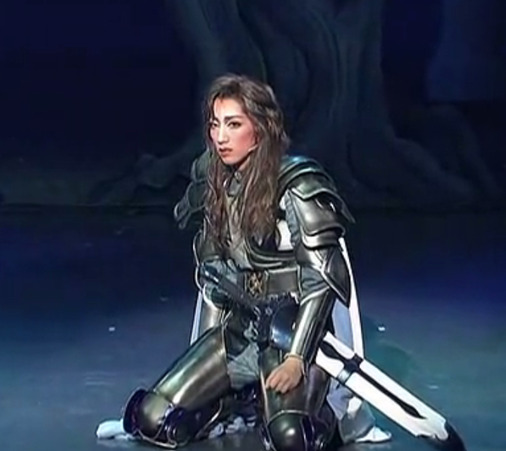
I can’t read about Lasse and not picture Makaze Suzuho in a silvery leather overalls armor.
The story is being told in first perspective, from Lasse’s point of view (now my nickname for Lancelot is truly fitting, because in this story she is a lass, heh heh). This is just a personal preference, but I don’t like this style. I prefer to see the story objectively, now Lasse passes her own judgment and opinion on everything and I can’t help but feel that it’s limiting. Also, damn does Lasse self monologue in a weird, cryptic manner. I know Arthurian myths aren’t known as stories grounded in reality and I know poetic language is to be expected. But sometimes Lasse’s thought process is hard to follow and she just says plain weird things. I get flashbacks to Rose of Versailles and Andre spewing out some nonsense about his love becoming a fossil encased in amber.
I do wonder if the writer is into Wicca or paganism, because there’s some pretty heavy anti-christian pro-paganism messages in the book. Lasse holds great respect for the old religion and one of the reasons she doesn’t like Arthur is because he is a Christian king. Which, for storytelling purposes, is understandable. The way Christianity wiped out the pagan religions of Europe by swordpoint (convert or have your head cut off) is a tragedy that isn’t often talked about (because there are other, more violent examples of forcibly spreading Christianity that tend to get the spotlight more). Of course Lasse, who was raised by Lady of Lake, a creature of old myths, would resent having this new religion replace all the ancient wisdoms she’d been taught and seeing the new faith shamelessly slap their holidays over the pagan festivals.
The clash of these religions is an interesting part of world building. But Lasse’s view of the old religion as something sacred and flawless and perfect is naive and childish. It’s like reading the thoughts of someone who was brainwashed by a cult at a young age and so is incapable of finding faults in the doctrine or criticizing anything related to the practices. Pagan religions could (and often would) be used as a tool of power and be rooted in the same harmful ideas as Christianity. For a woman, it makes no difference if the one commanding her to “know her natural place” was a patriarchal male God or a sacred pagan Goddess, her freedom to choose for herself is still being taken away by a religion who wishes to control her.
Lasse is secretly being raised as a boy, Rose of Versailles style. This means that once she is maturing, she must go through “an initiation ritual” meant for boys. This ritual? A fucking date rape. They make her drink some sort of drug or love potion and then provide a woman for her to sleep with so she can “become a man.” Once Lasse sobers up, she feels awful about what happened. And yet, even in this moment, realizing that she was drugged and made to have sex she didn’t want, she will not question the old religion. She will not criticize this disgusting practice, believing that though unpleasant, it must have been necessary for her to become adult. Yeah no, I’m sorry, but whenever religions start including sex in their rituals and pressure people into participating, a siren starts wailing in my head CUUUUUUUULLLLTTT! IT’S A FUCKING SEX CULT! GET THE MINORS OUT NOW!
I was happy, that the drugged rape doesn’t get described in detail. Sex is never described in detail in this book. In a way, I can see a scene where Lasse gets drugged to have sex could be a nod to the begetting of Galahad (which obviously won’t be happening in this version of the story). But still, I would have greatly appreciated if there hadn’t been a rape scene at all. The only kind of sex scenes I want in my books are the Sober and Enthusiastic Consent ones.
I once saw someone make a post that Lancelot and Gawain are the Arthurian version of Team Edward/Team Jacob. I must say, there’s a seed of truth in here. When you have a story where Gawain is the best knight and main character, Lasse tends to be painted as a selfish adulterous asshole who ruins everything, and when you have a story where Lasse is the leading role and painted as super virtuous, Gawain tends to gear up his negative traits. It’s like you can’t have both of them be likable at the same time. In this book, Gawain (and a whole bunch of other knights) get the asshole makeover treatment. Well, Gawain and Lasse do end up becoming friends but Gawain doesn’t stop being a jerkface and doesn’t really deserve Lasse’s friendship (If someone called my mother a whore, I would simply not forgive and befriend them. Rip to Lasse, but I actually care about my mother more than I do about some entitled dudebro.). I find this kind of writing a little lazy, making other characters pointlessly rude just so the main character looks better in comparison.
Ok, I’ve talked about the parts I didn’t like. Here’s some things I liked.
The book is illustrated. The art isn’t particularly fancy, but I liked it. I wish more books had illustrations, not just the books for kids.
The relationship between Lasse and Guinevere begins in their childhood, before Gwen is married to Arthur. I prefer love stories that give the characters a long period of time to develop their feelings for each other (as opposed to stories of them falling in love overnight Romeo&Juliet style). Also, it reminded me of the zuka musical.

Another thing I liked is that the relationship between Gwen and Lasse isn’t adulterous. They are very much in love with each other, but they won’t have sex. I would have forgiven them if they did, since Gwen didn’t have any say in her marriage and so it turned out a loveless political marriage. It’s a whole different thing to romanticize cheating and to understand that women in forced marriages had no other choice but to seek love of someone who loved her as a person, not as a moneybag. But Lasse and Gwen are virtuous, so they are above such thinking. When she married Arthur, Gwen made a promise to be faithful to him, and despite not loving him, she will not break this promise. Well, not until Arthur divorces her in favor of the False Guinevere.
Which brings me to the thing I probably liked the most - Gwen has an evil twin. And no, this isn’t the writer slapping some modern trope over a classic tale, this is a genuine legend. There are stories where Guinevere has a sister who seeks to replace her. Seeing a lesser known legend get adapted brought a smile to my face. We can tell a story of Gwen and Lasse without using the same old stories of Grail quest and abduction of Guinevere. It was fascinating.
Once the False Guinevere has convinced Arthur that she is the real queen, Gwen is cast out (well, after Lasse has to fight for her honour to save her from death penalty). Lasse and Gwen travel to Galehaut’s place (a friend of Lasse’s) and there, freed from her promise, Gwen finally has sex with Lasse. And only now, very close to the end of the book, is it revealed that Lasse is actually a woman. Saving this plot twist to so near the end feels a bit unnecessary, because I’m pretty sure 9 out of 10 people who buy this book already know about it and, much like me, bought the book exactly because of it. I can’t really imagine there being very many who managed to get to the end and actually be surprised.
The book kinda has a happy ending, but that’s partly because it ends before shit hits the fan re: Mordred. Mordred is in the book, but he’s only discussed about, never seen. There’s plenty of hints and foreshadowing that Arthur’s reign will come to a violent end some day. But the book leaves that to our imagination.
This is a decent book. If you’re into women and chivalric romance, go for it. But if you prefer a love story with more overtly sensual take on the intimate scenes, you might be happier with some other book, this one is very chaste. Also, you have to be willing to only see the story from Lasse’s perspective, and you have to be ok with Gawain being a prick. But all in all, it’s not a bad read.
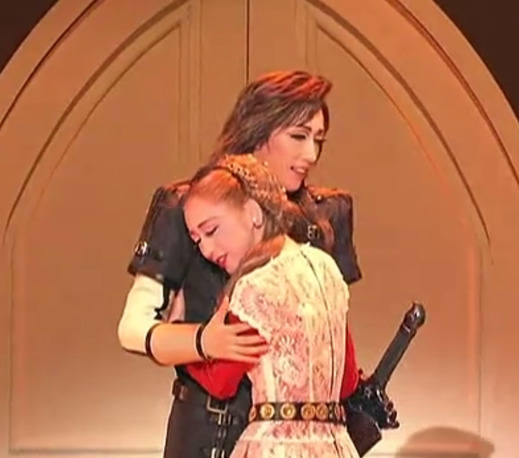
9 notes
·
View notes
Note
Pls infodump about lancelot from what i observe almost everyone hates him? (Ok its understandable bec of his affair with queen) im curious why do you like lancelot? And i remember a few days ago you post that there so many things you want to talk about him? And i want to see you rant/gush about his character, relationships, mental illness, his flaws etc ans also what is the difference between fate lancelot and lancelot in the legends? I want to know more about him he is complicated
OK its not that everyone hates him its that people hate what he stands for. the french side of arthurian lit is VERY focused on making lancelot seem like the greatest knight in the entire world because…. wow… hes french. and french people suck. stop normalizing the french. i like lancelot because of what he COULD stand for. theres a lot of things that could be delved into more (his mental illnesses, his communication issues, his inability to comprehend love, the struggle with being unholy or wrong, ect) but no one ever does. so i stole him hes mine now fuck the french they did him dirty.
uhm ok this is under a cut for talks of kinda heavy topics (lots of mental health talk, lots of abuse talk) and also cus its long. sorry i have a lot to say about him)
i like lancelot a lot cus i see myself a lot in him. mostly in his mental health and how he ends up dealing with situations. his struggle with violent mood swings and his huge burden of being labeled as a sinner or whatever for a relationship he admits to feeling trapped in is…. relateable… comforting to see in a fictional character i guess. as flawed as he is hes still heralded as a good person. hes still loved by his friends and his family. and thats nice.. i like it.
uhm for his mental health the main thing that comes out is his struggles with trauma, awful depression, and also just the fact he dissociates a lot. in knight of the cart he is so out of it he doesnt realize a knight is attacking him until hes thrown into the water in which he reacts violently and freaks the fuck out, trying to rip the guy off his horse. he like. physically can not handle extreme emotions and will either fall asleep so he doesnt have to face it (le morte says this is a known quality of him, he does this enough dinadan expects it as soon as he gets mad) or he swings so hard he has an extreme bout of depression (in the vulgate when trying to comprehend his relationship with guenevere and galehaut he just shuts down and spends all his time sleeping or staring at the river) or awful mania (see: the many times guenevere freaks out at him and he gets so upset he jumps out a window and lives in the woods). Lancelot has a lot of unworked out trauma from being r*** twice by the same woman who continues to use him and freak him out so much he cant find camelot safe (triggering another huge spike where he runs off into the woods) or the literal entire end of the legends where he has to deal with the trauma of while having one of his dissociative episodes in combat he accidentally kills gareth, someone he loves and adores like a brother or son and gets so upset he just accepts everything happening and hides in joyous gard, where his cousins have to BEG him to go and defend his honor from gawain whos basically knocking on his door pleading with lancelot to kill him.
lancelots inability to understand a lot of social nuances is also really interesting but like, ultimately leads to a lot of strife for him most namely galehauts death and gueneveres constant abuse. The thing is Lancelot basically idolizes guenevere and this is where a lot of the abuse and weird shit comes from in their relationship. lancelot was a very young knight who honestly didnt understand anything about BEING a knight when he came to court. the queen knighted him and him, being young and not understanding, took this as “i am her knight! i will do anything for her!” and guenevere just kinda ran with this? i dont rlly wanna go too into it ill do that later when i get farther in the vulgate and can talk more on it but it leads to lancelot being trapped in a relationship he admit hurts him, but the small sliver of love guenevere gives him when she needs him is enough to keep him in because his mindset is still “im her knight! this is what a knight should do for his lady!” Galehaut is a different situation where his blindness to social cues and other shit leads to a lot of drama and hellish shit and when he finally snaps and realizes “oh. oh no this is what love should be” its too late and galehaut is dead and lancelot isnt much better. his own mother has to come and convince him not to literally kill himself over this and sends him into a spiral of depression where he doesnt leave the joyous gard for months. when he does and when he comes back to court, no one really … cares? that galehaut is dead. and this is lancelots first experience with actual love and his first experience with the death of someone close to him. which is an awful double whammy to have to experience. he does have good friends like gawain and dinadan and tristan and his relationship with galahad is good but they all end up dead or turned against him by something thats he did and its just. god its so sad to watch. the only people lancelot is left with in the end are his cousins, and even at the end of all of that hes left alone with the corpses of people he thought he loved.
like hes a very flawed man. lancelot is a problem causer and not a problem solver. he doesnt try to he really doesnt, he strives to be the perfect knight mostly for some sliver of appreciation from someone he idolizes he never really ends up getting. he doesnt know how to cope, and ends up making things worse when he inevitably ends up screwing shit up because of this. hes called a sinner and unholy by god, and while he is very proud of his son for what he ends up achieving, has to deal with the trauma of the grail quest alone. he ends up killing someone he loves, and who genuinely respected and cared for him like a brother in a fit of him not being able to deal with heavy emotions. like he truly is in the wrong in most situations but like. in such a pitiable way. hes a good person, but lets his flaws overtake him a lot and pushes away the people who want the best for him. its like…. sad.
(about to talk about fate u can drop off now if u just wanted to read my arthurian lit opinions :-) )
i could go off about fate lancelot and all the problems i have with him for hours but i think the main thing i wanna talk about rn is how they handle his internalization of his life and then just did nothing with it. his wish for the grail is just to be told he was wrong. thats so fucking GOOD!! in life he was heralded as the best knight like of course his one regret was that no one ever stopped him and went “you are wrong. this is wrong. you are doing the wrong thing.” and that being all he wants out of the thing that can grant any wishes is soooooo soo cool and neat. and then they just reduced his personality to “oh boo hoo im so sad im going to fuck a married woman now” like. the fucking dissonance. like lancelot isnt the type for random flings. tristan sure i understand that a bit hes unhinged and hard to characterize and .. honestly does just go around fucking married woman. weirdo. but lancelots entire struggle is over his relationship with guenevere being both wrong morally and literally abusive! i jsut dont get it i dont understand how they built up something so interesting with zero and threw it all out the window it makes me so mad. i dont even wanna talk about fate lancelot anymore rn its giving me a headache cus im so mad.
#hes a really interesting and complex character with a lot of nuance but hes just so dumb#lancleot is the epitome of today i will cause problems on accident#hes just a mess of a man and trying to deal with taht fact but the problem is he has more power#than a man like that should have and it puts himself and others in dangerous situations#Anonymous
41 notes
·
View notes